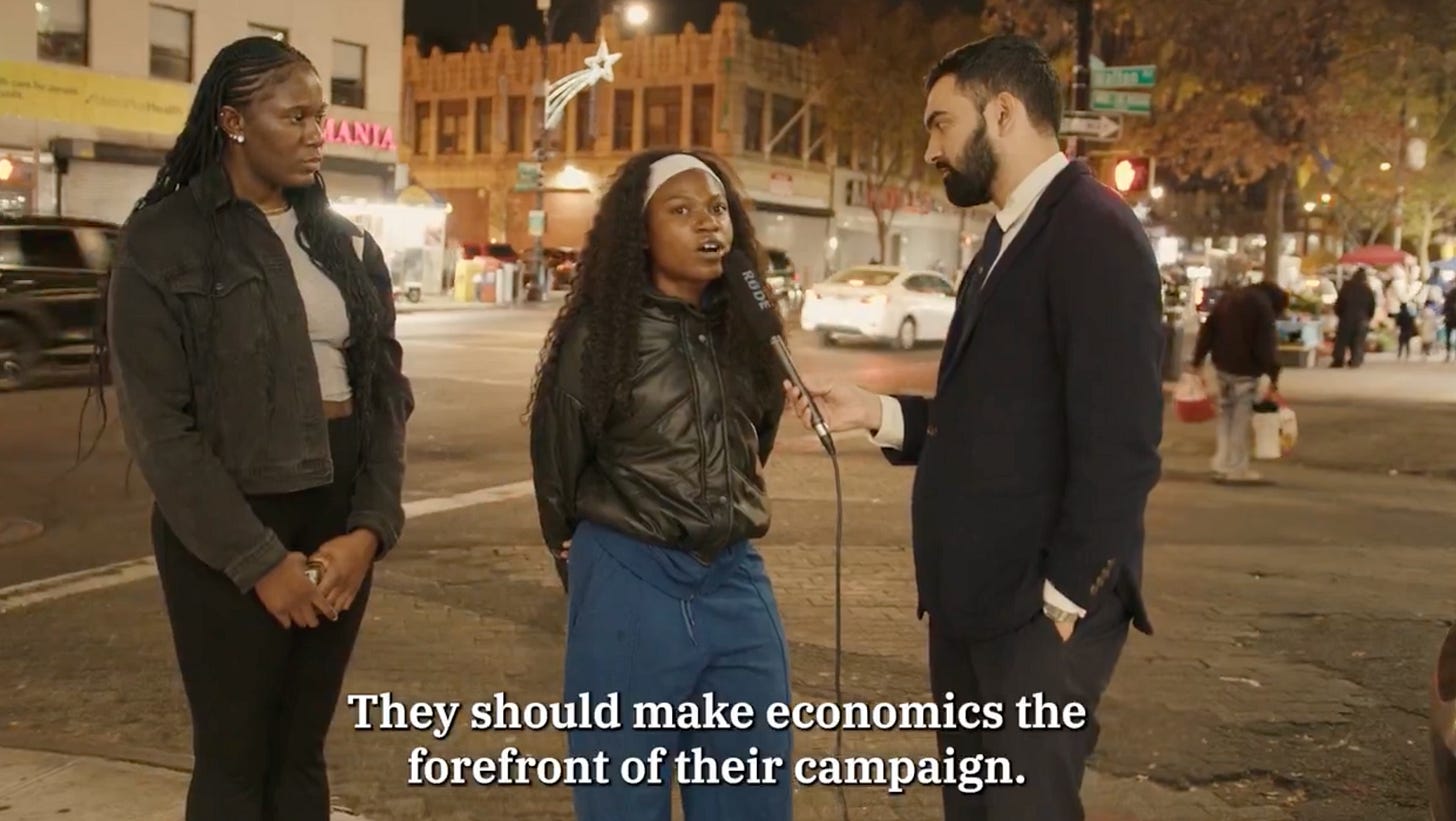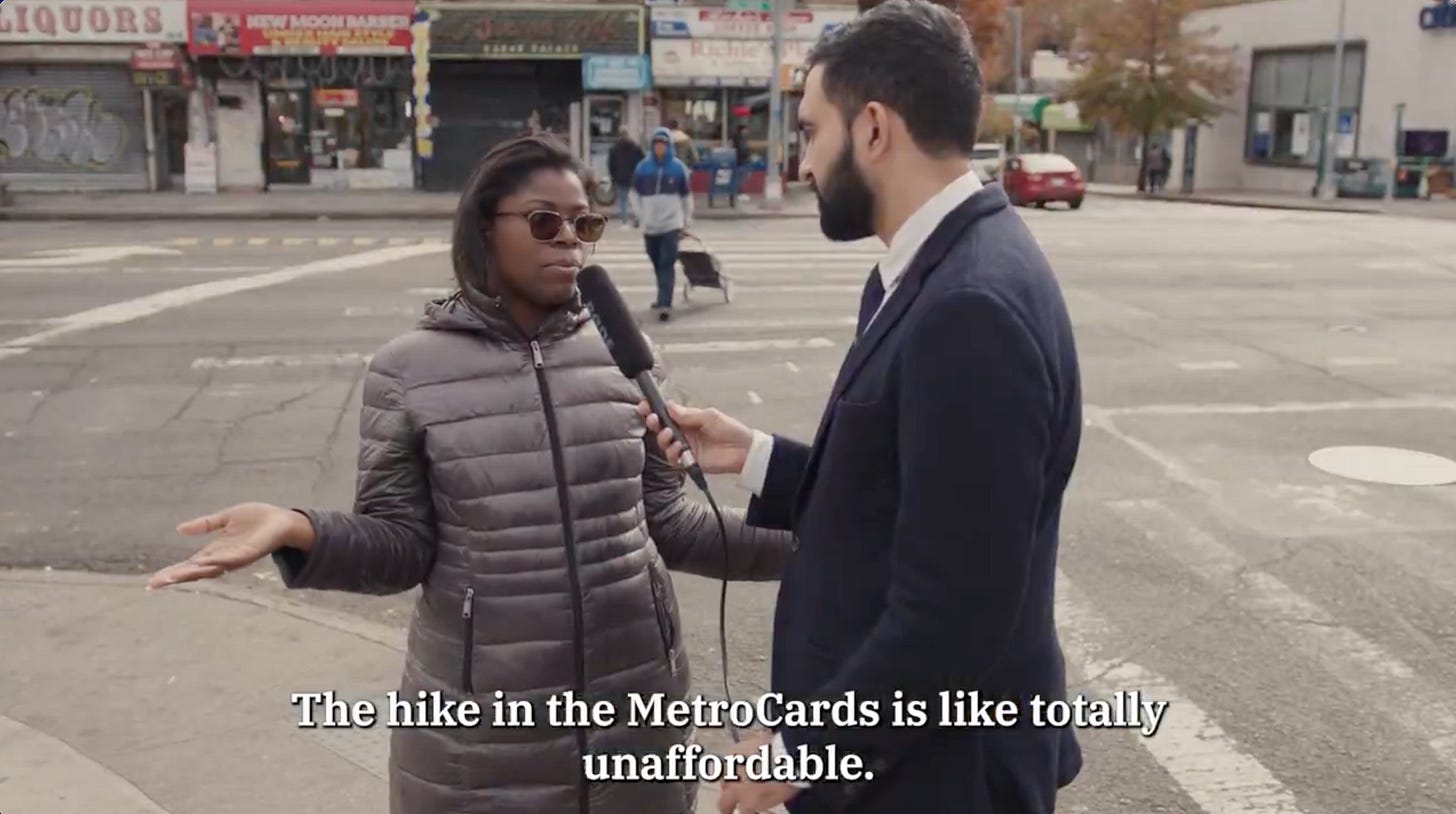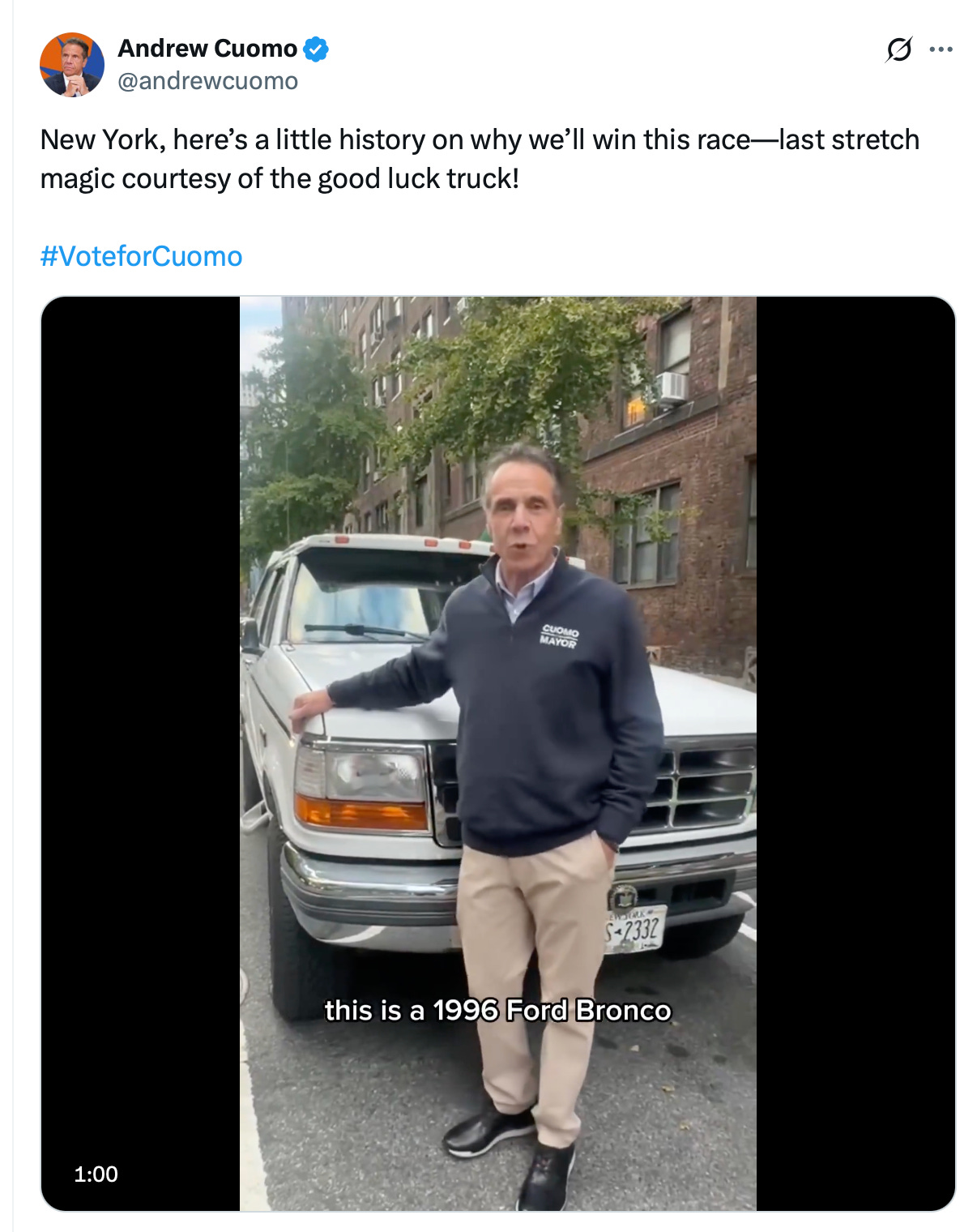Mamdani's Magic
How a 34-year-old became the next mayor of New York City
Zohran Mamdani won by literally meeting people where they’re at — in bodegas, subway stations, busy sidewalks, even at the New York Marathon. He met people on the streets, not to pitch them, but to listen and learn. These conversations informed his successful campaign more than his charm, social media prowess or any of the other superficial explanations major media are offering.
The focus on ordinary people was evident from the very start of his campaign. Last November, in one of his first campaign videos, Mamdani interviewed random passerby in Queens and the Bronx, simply asking about their concerns. They identified the unglamorous but urgent day-to-day issues that would become the focus of his campaign: the cost of living, childcare, housing, and transportation.
The video stood out from usual campaign content in how little of it focused on the candidate. He didn’t “approve this message.” There were no gotchas, no fact checking his opponents, no issue-oriented rejoinders. Virtually every shot focused on the interviewee rather than Mamdani, whose face you could not even see at times. He just stood there, quietly listening to what people had to say.
People’s comments were insightful for anyone who cared to listen. They were the message.
“If you’re speaking the things that people want to hear about, I don’t care what color you are, I’ll vote for you,” as one woman told him.
Mamdani ran a hyper-local campaign that avoided the Washington approach favored by campaign advisors and consultants. He did not try to graft his election onto the national partisan environment, avoiding the usual soaring rhetoric about freedom and democracy, the soul of America, blah, blah, blah. During the primary debate when candidates were asked about what foreign country they would first visit as mayor, Mamdani stood out for being the only candidate who didn’t say Israel — or any country at all.
“I would stay in New York City,” Mamdani said. “My plans are to address New Yorkers across the five boroughs and focus on them.”
There was also none of the usual aversion to unscripted interactions with the public or on uncomfortable issues that is symptomatic of a distrust of the people. He said what he thought, even on hot button issues like Gaza, which stood out against a sea of other politicians clearly terrified of addressing such matters. Mamdani respected voters enough to tell them the truth about himself, even things they might not want to hear. During one of the debates, when asked if he’d ever purchased anything at a cannabis shop, instead of the usual politician equivocation (“I smoked but didn’t inhale”), he smiled and told the truth: “I have.”
Mamdani would often quote former New York mayor Ed Koch’s saying, “If you agree with me on nine out of 12 issues, vote for me; if you agree with me on 12 out of 12 issues, see a psychiatrist.” This speaks to his trust that people are intelligent enough to handle disagreement, contrary to the typical politician approach of avoiding conflict at all costs, fence-sitting on contentious issues, and the like. (Consider Senate Minority Leader Chuck Schumer’s refusal yesterday to say which mayoral candidate he voted for.)
Mamdani decried the lack of respect for voters in his victory speech last night. “You showed that when politics speaks to you without condescension, we can usher in a new era of leadership,” he said.
Another campaign video featured Mamdani speaking to Halal food truck vendors, virtually ubiquitous throughout the city. A pressing issue but one not obvious to people outside of New York (including myself) was why these Halal vendors’ food had suddenly become so expensive. City regulations and other forms of needless bureaucracy, he was told. He promised to get to the bottom of it. His enthusiasm about what might seem like a minor issue was endearing to people and signaled that he was paying attention.
Above all, Mamdani’s campaign was a rejection of the bunker strategy of others: where candidate hide from voters, limit interviews, and rule from “the room where it happens.”
“We’re outside, because New Yorkers deserve a mayor that they can see, they can hear, they can even yell at,” Mamdani said in a video recording of him running in the New York Marathon posted to social media.
As Mamdani sees it, facing the public, even if it might heckle you, is part of the job of being an elected official. Obvious as this may seem, it is a more genuine and humble attitude ofthe Washington national figures who believe that their role as philosopher kings is to reign over and above the public. It’s amazing anyone still thinks there’s some inherent dignity to elected office after Donald Trump, not after President Trump’s convictions (the legal ones, that is), or, say, his latest AI video depicting him manning a fighter jet dropping poop on No Kings protesters. Or Biden sundowning at the presidential debate last year (“We finally beat Medicare!”) Or eight sitting members of Congress having died in office since 2022.
Mamdani’s view of a politician’s job contrasts sharply with the political establishment’s zero tolerance attitude toward risk. Former Governor Andrew Cuomo is a living embodiment of this old school micromanage and control everything approach. Having reportedly decided years ago to never run in an election that he thought carried any real risk of losing (oops), his campaign reflected this risk aversion in spades.
While Mamdani was busy doing interviews with seemingly anyone who asked — including hostile ones on cable news shows obsessed with his views on Israel — Cuomo adopted the same bunker strategy as so many incumbent politicians. Forget about appearing in public. Cuomo would barely even do interviews with traditional media outlets during the primary. When local media fixture Brian Lehrer invited all nine major candidates in the primary race to a public debate, all but Cuomo accepted.
“Eight of them accepted and came on,” Lehrer told The New Yorker magazine. “The exception is Andrew Cuomo, because that’s his campaign strategy.”
Meanwhile, Mamdani was seemingly everywhere, on the streets, on all the major social media platforms, doing interviews with shows and podcasts big and small, friendly and hostile.
Social media, especially short video, certainly played an important role in Mamdani’s victory. But the reason so much of his content went viral was because of its focus on ordinary people. This point gets lost in a lot of the major media coverage, which is looking for any way it can downplay the profoundly important role of the public and of populism to Mamdani’s success.
The New York Times, which endorsed Cuomo, dubbed Mamdani a “TikTok Savant.” The implicit message here is that he had manufactured some kind of irresistible social media opium to hypnotize the impressionable masses into supporting him despite his views. It’s exactly the kind of condescension that Mamdani slammed in his victory speech.
All the production value in the world won’t make social media content viral if it lacks a compelling message. Cuomo learned this the hard way, when after losing the primary, he pivoted to short video content that quickly became a laughingstock on social media because of how scripted and empty it all was. Instead of Mamdani’s spontaneous interactions with ordinary people, Cuomo’s videos focused on himself: jumping a car, standing in front of a 1996 Ford Bronco, or just plain standing there while he talks at you.
Mamdani’s magic is his understanding that the masses are the message. His victory speech spotlighted everyday workers from warehouse workers to cooks, demanding that they be allowed to hold power, too:
“ For as long as we can remember, the working people of New York have been told by the wealthy and the well-connected, that power does not belong in their hands. Fingers bruised from lifting boxes on the warehouse floor. Palms callous from delivery. Bike handlebar knuckles scarred with kitchen burns.
These are not hands that have been allowed to hold power, and yet over the last 12 months you have dared to reach for something greater tonight. Against all odds, we have grasped it. The future is in our hands.”
Let’s see how the mainstream now tries to downplay Mamdani’s populism by labeling him a unicorn, as a “generational talent” that only comes along like a 100-year flood. Let’s see how he is compared to Obama, the implicit message being that he talks a good game but won’t be able to do much.
Let’s see how many billionaires are quoted in the papers versus how many falafel vendors.
— Edited by William M. Arkin





Why do New York mayors need to be frequently traveling to other countries again? Especially after Adams’s hilariously corrupt excursions to Turkey, it seems Mamdani’s was the only correct answer.
Well written, Ken.
Obama insulted Trump once at a publicized dinner and what was Trump's reaction?
Last night, Mamdani mentioned the name of Trump at least eight times. New York City needs to protect Mamdani like a presidential candidate, if not more.